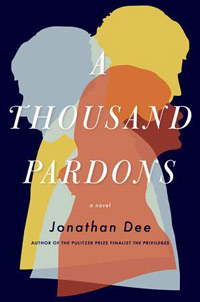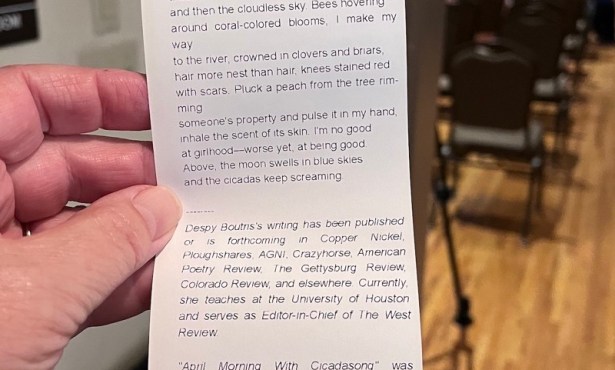Review of Jonathan Dee’s A Thousand Pardons
A Tragicomic Exploration of One Family’s Public Disintegration
Ben Armstead is an unhappy guy. He hates his job as lawyer; he’s tired of his wife, Helen, and his daughter, Sara; and he can’t stand where he lives, a large, well-appointed home in a commuter town north of New York. In full-on self-destruct mode, Ben has a distasteful sexual encounter with an intern whose boyfriend happens to be waiting outside their hotel room, and well before the first chapter is over, he loses everything.
Not surprisingly, Helen is furious. Nearly broke and spurned by most of her former friends, she reenters the work force. After no one else will accept the position, she lands a job at tiny Harvey Aaron Public Relations and moves to an equally tiny apartment in Manhattan with Sara. Ironically, considering her recent troubles, Helen has a knack for talking men into expressing regret in public. Her first big triumph is to convince the owner of a chain of Chinese restaurants to accept responsibility for a business mistake: “Without getting into specifics, you will apologize, and ask your customers and the people of New York for their forgiveness. And they will give it to you. They want to. People are quick to judge, Mr. Chin, they are quick to condemn, but that’s mostly because their ultimate desire is to forgive.”

And that, essentially, is the thesis of the novel, a theme that Dee will return to for the rest of the book. A Thousand Pardons is short, with lots of twists and turns, so it’s no surprise that in a few dispassionate sentences worthy of E. M. Forster or Virginia Woolf, Harvey is quickly disposed of in a car accident, and Helen takes over his business. Soon, she is hired away to work for the Crisis Management team of a much larger firm.
At home, however, things aren’t going well. Sara can’t stand her mother, and Helen is subject to “cold-eyed expressions of disregard…made more stunning by the offhandedness with which they are delivered.” On the surface, Sara is insufferable, but Dee’s omniscient narrator takes us inside her mind so that we, too, can experience Sara’s sense of free fall and alienation. The Armsteads adopted Sara from Chinese parents, and at her new high school she is drawn to Cutter, an adopted African-American teen who is deeply skeptical of the Establishment and has a nihilistic streak nearly as wide as her father’s.
The second half of the book is taken up with Helen’s attempt to help out an old schoolmate who has gone on to become a world-famous movie star. Readers can be forgiven if Hamilton Barth — an aging but still charismatic actor — sounds quite a bit like Harrison Ford, but the character’s real point in the novel is to demonstrate not just the broad gap between appearance and reality in contemporary America, but how much stronger a safety net the rich have than most people.
Ultimately, the fractured family makes some tentative gestures toward healing.
After a stint in prison, Ben very slowly attempts to reconstitute his life and reconnect with his daughter; he even, improbably, becomes friend and confessor to the wayward Hamilton. A Thousand Pardons ends on a note of resignation. Our dreams are doomed to fail, Dee seems to be saying, but maybe that’s what we expected all along.



